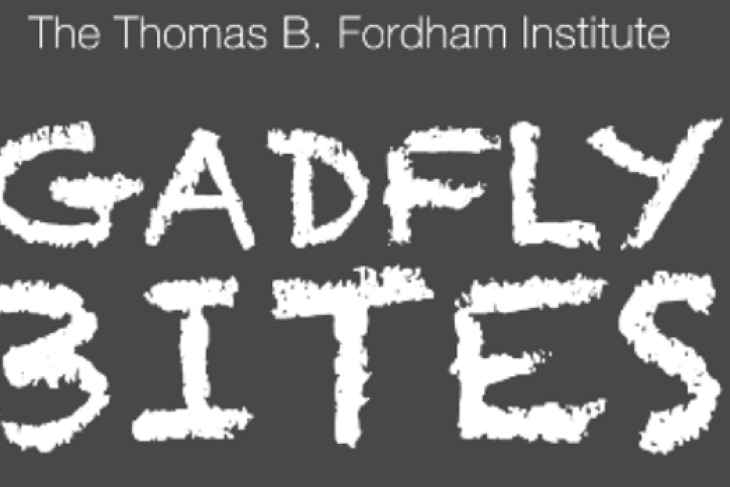- The only education news that anyone is interested in to close this week is the passage of HB 154 out of both the House committee and out of the full House in rapid succession. You will recall that 154 is one of the bills which would, among other things, end the state’s academic distress paradigm as it currently exists. Here is a roundup of coverage of the bill’s passage from earlier in the week, all of which include quotes from our own Chad Aldis talking about the problematic retreat from academic accountability that the bill represents. Gongwer coverage is here. (Gongwer Ohio, 5/1/19) Coverage from the Dispatch is here. (Columbus Dispatch, 5/1/19) The MJ’s coverage included a number of points from Chad, but it also included commentary from folks via Twitter, too. So there’s that. (The Morning Journal, 5/1/19) The Chronicle took a couple of days to post its full coverage and so was able to include everything and the kitchen sink. While Fordham’s testimony against HB 154 is noted but not quoted, the Ohio Democratic Party’s recently (timely) approved resolution against a “school privatization agenda”, which named Fordham as Public Enemy Number 2 (thanks gang!), is discussed in a bit more detail. (Elyria Chronicle, 5/2/19)
- If you read the foregoing pieces thoroughly, you may have noticed a bit of skepticism toward HB 154’s ultimate chances for enactment. The following pieces lean into that skepticism as the focus of their coverage. Since Dayton City Schools is the only district currently at risk of falling into academic distress at the end of this school year, HB 154’s proposed ban on new Academic Distress Commissions is characterized in DDN coverage as the only way – the Hail Mary, if you will—by which the district can avoid having an ADC take charge. In the subhead, the district is once again said to be “in limbo” as to a declaration of academic distress, as if there is literally nothing the district can do to improve its odds of not being held accountable for sucking academically for many years short of praying for 154’s enactment. I figure that if anyone in Dayton has that mindset, dialed up pessimism about the bill’s chances makes some sense for them. While reading the piece, you can hear about how nearby Trotwood-Madison City Schools was able to avoid a declaration of academic distress (and, of course, all that currently comes along with that) by improving its district report card. You know: changing their way of doing business so as to boost student achievement. This was actually pointed out in testimony on the House floor prior to the vote on HB 154 and is quoted here. This simple fact alone gives lie to the “helpless, in limbo” business as we have noted several times previously in these clips. What is, unfortunately, missing from the DDN coverage, is a similar observation about Dayton City Schools also made on the House floor. In that testimony, local state Rep. Niraj Antani described some actual actions being taken by Dayton City Schools in the last year to try and improve teaching and learning all because of the district’s aversion to an imminent declaration of academic distress. It may be too little and way too late, but it ain’t “limbo”. How low can you go? (Dayton Daily News, 5/2/19) All that testimony is also absent from this editorial from the Canton Repository, opining in favor of HB 154. While the editorial contains the words “Failing school districts must be held accountable. No one should get a free pass, nor is anyone asking for one” at the end, it is the headline that matters. In it, it is the ADC law which is failing and which must be addressed first and foremost, according to the editorial board. (Canton Repository, 5/2/19) The pessimism expressed most clearly in the Vindy coverage, interestingly enough, is that HB 154’s replacement for ADCs might not be quite as robust (let’s call it) as what Youngstown City Schools has experienced for the last 2+ years. Those experiences are shorthanded here for your erudition. (Youngstown Vindicator, 5/2/19)
- The president of the elected board of Youngstown City Schools (who has been pretty quiet recently, if you ask me—but of course no one has) also seems to have a little skepticism about the ultimate fate of HB 154. And about the other bills concerning ADCs, and about all the court cases concerning ADCs, and about the state budget which could also include stuff about ADCs. With all of this “uncertainty” in the Northeast Ohio air, Madam President is advising Youngstown’s Academic Distress Commission members to hold up on signing a contract with their newly-chosen CEO. At least until the dust settles, you know. In case we don’t need him. (WYTV-TV, Youngstown, 5/2/19) But no one up in Muskegon, least of all the new CEO himself, seems interested in holding up his departure to Ohio for anything. (Muskegon Chronicle, Michigan, 5/3/19)
- Finally this week, in only peripherally-ADC-related news, we have a follow up from Wednesday’s sad tale of Dayton’s elected school board having difficulty giving their supe and treasurer well-intentioned marching orders without falling afoul of the Ohio Revised Code. Later in that same five-and-a-half-hour meeting (!), the board members were able to do what they came there to do—pass an agenda. Unfortunately, even when Dayton’s board manages to get down to business, it all seems pretty depressing. (Dayton Daily News, 5/3/19)
Did you know you can have every edition of Gadfly Bites sent directly to your Inbox (in case you want to alleviate your ongoing skepticism by signing up for such a newsletter)? Subscribe by clicking here.
Policy Priority:
Topics:


